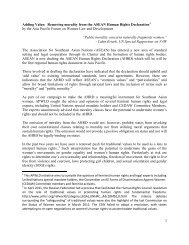A Digest of Case Law on the Human Rights of Women - Asia Pacific ...
A Digest of Case Law on the Human Rights of Women - Asia Pacific ...
A Digest of Case Law on the Human Rights of Women - Asia Pacific ...
You also want an ePaper? Increase the reach of your titles
YUMPU automatically turns print PDFs into web optimized ePapers that Google loves.
The Republic <str<strong>on</strong>g>of</str<strong>on</strong>g> Kiribati v Tieta Timiti and Rabaere Robuti (<strong>Pacific</strong> Islands: Kiribati)<br />
<strong>the</strong> incident. It fur<strong>the</strong>r argued that her evidence should be believed because it was<br />
corroborated by three witnesses. The prosecuti<strong>on</strong> also presented a sec<strong>on</strong>d argument<br />
claiming that <strong>the</strong> requirement for corroborati<strong>on</strong> violated <strong>the</strong> rights <str<strong>on</strong>g>of</str<strong>on</strong>g> women under<br />
secti<strong>on</strong>s 3 and 15 <str<strong>on</strong>g>of</str<strong>on</strong>g> <strong>the</strong> C<strong>on</strong>stituti<strong>on</strong>. Secti<strong>on</strong> 3 <str<strong>on</strong>g>of</str<strong>on</strong>g> <strong>the</strong> C<strong>on</strong>stituti<strong>on</strong> guarantees<br />
all citizens equal protecti<strong>on</strong> <str<strong>on</strong>g>of</str<strong>on</strong>g> <strong>the</strong> law and secti<strong>on</strong> 15 provides all citizens with<br />
protecti<strong>on</strong> from discriminati<strong>on</strong>. The prosecuti<strong>on</strong> stated that although secti<strong>on</strong> 15 does<br />
not explicitly identify sex as a ground <str<strong>on</strong>g>of</str<strong>on</strong>g> discriminati<strong>on</strong>, it ought to be read into <strong>the</strong><br />
legislati<strong>on</strong>. The prosecuti<strong>on</strong> argued that <strong>the</strong> Court should follow this interpretati<strong>on</strong><br />
as it is supported by <strong>the</strong> principles formulated in CEDAW and o<strong>the</strong>r internati<strong>on</strong>al<br />
instruments that protect <strong>the</strong> rights <str<strong>on</strong>g>of</str<strong>on</strong>g> women.<br />
The defendants argued that <strong>the</strong> complainant’s evidence that she did not c<strong>on</strong>sent<br />
was unreliable because she suffered an illness that caused her to imagine things<br />
and disturbed her reas<strong>on</strong>ing. Fur<strong>the</strong>r, <strong>the</strong>y argued that as some <str<strong>on</strong>g>of</str<strong>on</strong>g> <strong>the</strong> corroborative<br />
evidence presented by <strong>the</strong> prosecuti<strong>on</strong> was c<strong>on</strong>tradictory, her evidence had not been<br />
corroborated. Therefore, <strong>the</strong> defendants argued <strong>the</strong> judge was obliged to warn himself<br />
<str<strong>on</strong>g>of</str<strong>on</strong>g> <strong>the</strong> danger <str<strong>on</strong>g>of</str<strong>on</strong>g> c<strong>on</strong>victing <strong>on</strong> uncorroborated evidence. This rule, it was fur<strong>the</strong>r<br />
argued, was not discriminatory because it applied to both sexes, notwithstanding that<br />
<strong>the</strong> majority <str<strong>on</strong>g>of</str<strong>on</strong>g> rape victims are women.<br />
Decisi<strong>on</strong><br />
The Court found <strong>the</strong> defendants guilty <str<strong>on</strong>g>of</str<strong>on</strong>g> rape. The judge believed <strong>the</strong> evidence given<br />
by <strong>the</strong> complainant that she had not c<strong>on</strong>sented to intercourse. He also held that <strong>the</strong><br />
explanati<strong>on</strong>s given by <strong>the</strong> defendants that <strong>the</strong> complainant had c<strong>on</strong>sented could not<br />
be rec<strong>on</strong>ciled with <strong>the</strong> evidence that <strong>the</strong> complainant, as so<strong>on</strong> as she had recovered,<br />
had reported <strong>the</strong> matter to <strong>the</strong> police. The judge also noted that she had maintained<br />
her credibility and her versi<strong>on</strong> <str<strong>on</strong>g>of</str<strong>on</strong>g> events despite a l<strong>on</strong>g cross-examinati<strong>on</strong>. He<br />
accepted <strong>the</strong> evidence <str<strong>on</strong>g>of</str<strong>on</strong>g> <strong>the</strong> witnesses who corroborated <strong>the</strong> complainant’s versi<strong>on</strong><br />
<str<strong>on</strong>g>of</str<strong>on</strong>g> events. It was illogical according to <strong>the</strong> judge, that she would have willingly<br />
agreed to intercourse with both men in such public circumstances especially when it<br />
was clear she was very distressed.<br />
The Court also held that <strong>the</strong> rule <str<strong>on</strong>g>of</str<strong>on</strong>g> corroborati<strong>on</strong> was not relevant to this case because<br />
it is a requirement in rape <strong>on</strong>ly if <strong>the</strong> credibility <str<strong>on</strong>g>of</str<strong>on</strong>g> <strong>the</strong> complainant’s evidence is<br />
in questi<strong>on</strong>. Since <strong>the</strong> Court believed <strong>the</strong> evidence <str<strong>on</strong>g>of</str<strong>on</strong>g> <strong>the</strong> complainant <strong>the</strong>re was<br />
no requirement for corroborati<strong>on</strong> or warning to ei<strong>the</strong>r judge or jury. Therefore, <strong>the</strong><br />
issue <str<strong>on</strong>g>of</str<strong>on</strong>g> whe<strong>the</strong>r <strong>the</strong> requirement for corroborati<strong>on</strong> is discriminatory and in breach <str<strong>on</strong>g>of</str<strong>on</strong>g><br />
internati<strong>on</strong>al c<strong>on</strong>venti<strong>on</strong>s was held not to be relevant. The judge commented that in<br />
his opini<strong>on</strong> regardless <str<strong>on</strong>g>of</str<strong>on</strong>g> whe<strong>the</strong>r corroborati<strong>on</strong> is present, <strong>the</strong> fundamental issue is<br />
whe<strong>the</strong>r <strong>the</strong> complainant is believed. If <strong>the</strong> victim is not believed <strong>the</strong>n <strong>the</strong> accused will<br />
be acquitted, regardless <str<strong>on</strong>g>of</str<strong>on</strong>g> <strong>the</strong> presence <str<strong>on</strong>g>of</str<strong>on</strong>g> corroborating evidence. Both defendants<br />
were c<strong>on</strong>victed and sentenced to impris<strong>on</strong>ment for seven years.<br />
57



